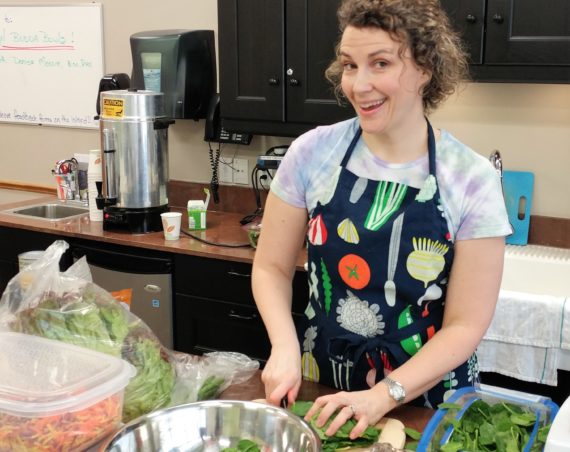It’s September and you know what that means – back to school and time to start thinking about snacks! Instead of reaching for the same old snacks, switch it up and try some raw snacks instead! Tara Tomulka is the founder of Rawcology, a snack company that makes superfood coconut chips and raw crunch granolas that are always raw, certified organic, plant-based, and free from the top 11 allergens.
We chatted with Tara about how she made the switch from corporate communications to holistic nutritionist and entrepreneur, why coconut is the ultimate superfood, and what does ‘raw snacks’ actually mean?
WEHL: Tell us a little about yourself and why you became interested in wellness and starting Rawcology.
 TT: Hi! I’m Tara Tomulka, Holistic Nutritionist and Founder of Rawcology.
TT: Hi! I’m Tara Tomulka, Holistic Nutritionist and Founder of Rawcology.
My story with Rawcology begins with my quest to examine the question, “What legacy do you want to leave behind?” After several years of developing a career in corporate communications, I started to not recognize myself, as my once positive, calm and ambitious nature had been replaced with anxiety, fatigue, and a lack of excitement for what the future held. I knew a change was required and so I started small by learning about holistic ways to heal and spent more time exploring the things that I love – cooking and putting my creativity into action. Soon after, I took a leap of faith and completed my Holistic Nutrition training from the Institute of Holistic Nutrition, in addition to becoming Certified in Culinary Nutrition and a Certified Raw Food Teacher.
With Rawcology, I first created a plant-based community offering recipe development, nutritional consultations, culinary classes and natural, organic foods for all types of eaters. My experience in the kitchen also led me to become a Culinary Instructor at George Brown College’s Centre for Culinary Arts, where I developed and taught the school’s first ever Raw Vegan Food course and Vegetarian Culinary Arts II program. Given my passion for nutrition and innovative foods, I decided to turn Rawcology’s focus to producing healthier packaged food products for all individuals to enjoy regardless of dietary restrictions.
WEHL: What is your philosophy on wellness?
TT: As a Holistic Nutritionist, I believe in an individual approach to wellness. There is not one diet, exercise program or lifestyle that works for all. You have to listen to your own body and see what works best for you. While I strongly believe in eating a variety of plant-based foods everyday, true wellness for me means not being overly restrictive – if you want to eat the cookie, eat the cookie! I also believe wellness is about finding ways to move your body on a regular basis, in a way that works for you, and in honouring self-care, whether that’s meditating, getting enough sleep, taking a bath or reading a good book.
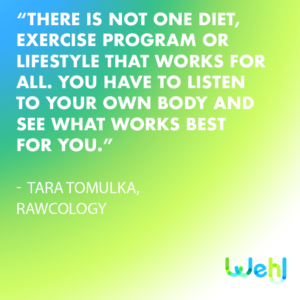
WEHL: How is your product “raw” and what does “raw” mean?
TT: Our products are “raw” as we dehydrate them at 115°F for optimal nutrition, flavour and to keep the living enzymes and nutrients intact. We also follow raw food principles by sprouting the sunflower and pumpkin seeds in our products; this removes the seed’s enzyme inhibitors and makes them living foods.
Raw food is food in its most natural state – it’s unprocessed, unaltered and has not been heated above 118°F. The four major raw food groups include: fruits, vegetables, nuts/seeds, and sprouted grains/legumes.
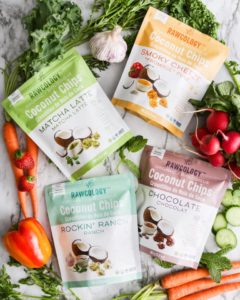
WEHL: You’ve recently developed George Brown’s raw vegan food course – how did that happen and how has the response been?
TT: Rawcology was featured by BlogTO as one of the 15 Instagram Accounts for Toronto Vegans to Follow. One of George Brown’s program coordinators read the article, started following Rawcology and learned that I was leading raw food workshops. George Brown loved the recipes I shared and invited me in for a meeting to discuss the possibility of developing a course for them. I started teaching the course back in 2016 and the class quickly grew from only 12 students a class to a packed class of 24 students.
It’s amazing to see how open people now are to learn about healthy food options! A lot of the students wanted to take the course because of their own or their loved ones’ health issues. I have stepped back from teaching at George Brown to grow Rawcology but the class is still available.
WEHL: What makes Rawcology different from other plant-based snack options on the market?
TT:
- We have a unique production process that dehydrates our snacks at low temperature for optimal nutrition, crunch and flavour.
- We have bold and delicious flavours, from Smoky Cheeze Coconut Chips to our Banana with Maca Raw Crunch Granola.
- We are committed to using only the finest organic ingredients and superfoods, including raw cacao, matcha, turmeric, maca, acai, wild blueberry powder, camu camu and sprouted seeds.
- Our products are free from the top 11 allergens so that everyone can enjoy our snacks regardless of dietary restrictions.
- Our products are Certified Organic, Non GMO Project Verified, Certified Vegan, grain free, paleo and we have several keto friendly options.
WEHL: Your products are coconut-based – why did you choose this ingredient?
TT: Coconut is the ultimate superfood! Coconut is rich in fibre, packed with immune-enhancing properties and is an excellent source of healthy fats and medium-chain triglycerides (MCTs). MCTs are easily converted into energy, used as fuel by the body and increase levels of beneficial HDL cholesterol.
Healthy fats are critical for energy levels, brain health, and balancing hormones. Coconuts are a source of vitamin C, vitamin E and B-vitamins in addition to minerals, including potassium, magnesium, manganese, calcium, iron, copper, zinc 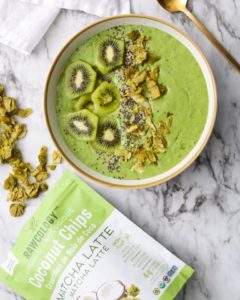 and selenium.
and selenium.
WEHL: What are coconut chips and how do you make them?
TT: Coconut Chips are delicious snacks made with coconut flakes coated in a unique sauce!
Our Smoky Cheeze and Ranch Chips have a longer production process where we start by sprouting the sunflower seeds overnight. We then make the sauces by mixing the ingredients in a large industrial food processor. From there, we mix the sauce with the coconut chips. When I first started the business, we mixed the coconut and sauces by hand. We’ve since invested in a mixer that mixes the chips so that the sauce is evenly coated within 10 minutes. After the coconut has been coated in sauce, we lay the chips on dehydrator trays which then go into our industrial dehydrators and are left to dehydrate for 24 hours.
WEHL: Your coconut chips include superfoods in each flavour – matcha, raw cacao, sprouted seeds and turmeric. What makes each of these superfoods and how can we benefit from incorporating them into our diet?
TT: Superfoods are nutrient-dense foods that are especially beneficial for health and well-being. There is no official criteria for establishing foods as superfood status but usually they are foods that have exceptionally high antioxidant power, are rich in fiber, a rich source of one or more vitamins or minerals, or have some unique beneficial plant chemical that we can’t find elsewhere.
Matcha is immune-boosting, antioxidant rich and provides calm energy with L-theanine that works with caffeine to boost cognitive performance.
Raw cacao is a pure, unprocessed, nutrient dense superfood rich in antioxidants, fibre and magnesium.
Turmeric is anti-inflammatory and can have positive effects on reducing pain and aiding digestion.
Sprouted seeds are rich in vitamin E, selenium, healthy fats and protein.
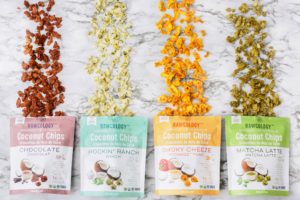 WEHL: What is your most popular flavour of coconut chips? Which flavour do you recommend people try first?
WEHL: What is your most popular flavour of coconut chips? Which flavour do you recommend people try first?
TT: Our most popular flavour of coconut chips are either our Smoky Cheeze or Chocolate Coconut Chips. I recommend our Smoky Cheeze Chips as they are the most unique!
WEHL: What is the difference between coconut nectar and coconut sugar? Why are these good sweetener options?
TT: Coconut nectar is the sap from the flower blossom of the coconut palm tree. It has a thick, syrup consistency. Coconut sugar is made by crystallizing the coconut flower nectar. The nutritional profile and glycemic index of coconut nectar and coconut sugar are the same. The consistency and the taste differ.
Coconut nectar and coconut sugar are good options since they are rated one of the lowest sweeteners on the Glycemic Index at 35 compared to honey and maple syrup both at 55 and refined cane sugar at 70. We try to keep our products as low sugar as possible, with most flavours containing only 1-3 grams of sugar per serving.
While we prefer to use coconut nectar over coconut sugar, since it’s slightly less processed, we use coconut sugar in our Matcha Coconut Chips and Blueberry Granola to maintain an even consistency of sauce on the chips. We tried using nectar for these products but it wouldn’t dehydrate properly and always ended up being a sticky mess!
WEHL: Your latest granola product has the addition of adaptogens – what are they and why do they make a good fit in your granola?
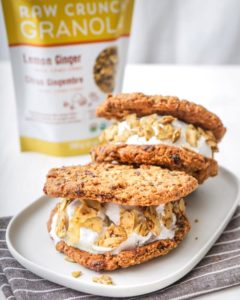
TT: The word adaptogen comes from the description of these plants’ ability to “adapt” according to what your body needs in that moment. From a scientific standpoint, adaptogens are defined as producing a non-specific state of resistance in the body to physical, emotional and/or environmental stress and have a normalizing effect on the body to restore physiological function that has been altered due to stress.
Adaptogens are said to help the body adapt to stress and resist fatigue by functioning through two systems: the hypothalamic-pituitary-adrenal (HPA) axis, which plays a role in stress response, and the sympatho-adrenal system (SAS), which is responsible for the fight or flight response. While all adaptogens affect these two systems, their varying chemical make-ups produce different properties.
The key adaptogen we feature is “maca” in our Banana Granola. Maca has a somewhat caramel flavour so it pairs well with Banana to give it a banana bread flavour. Maca supports immunity, helps boost energy levels and reduces stress in the body and since granola is typically enjoyed first thing in the morning, it’s the perfect adaptogen to enjoy at this time and set you up well for the day ahead.
WEHL: What is your current favourite adaptogen, why do you like it, and how do you incorporate it into your diet?
TT: My favourite adaptogen really is maca! As an entrepreneur, you’re pulled in so many directions and I really need an added energy boost first thing so I love maca in my morning smoothies or I get it from our Banana Granola that’s mixed with coconut yogurt and a drizzle of almond butter.
WEHL: Do you have a favourite summer recipe that you’d like to share with us?
TT: I love this Grilled Romaine Vegan Caesar Salad recipe topped with our Smoky Cheeze Chips instead of croutons!
Connect with Tara Tomulka and Rawcology:
- Web: www.rawcology.com
- Email: [email protected]
- Phone: 647-969-9412
- Wehl Platform: @rawcology
We invite you to join our all-in-one healthy lifestyle app at Wehl.com!


